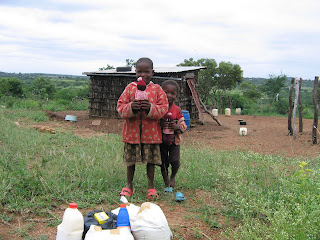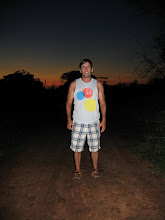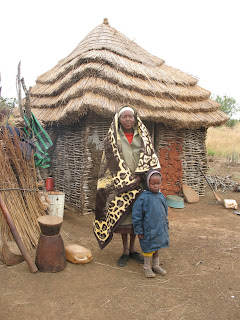I know, it has been a very long time since my previous entry. There are a million and one excuses, but that would only help me to feel better (about my lack of communication) and no one else would care or possibly believe the ones that I chose. What I have really wanted to do was to rant, and who wants to hear me complain? Well the answer was many of you, so here it goes.
November 24th, 2008 was our departure date from New York. David and I have completed six months of our one year volunteer commitment. Unfortunately, I have to report that I have not been able to change Africa (and in particular Swaziland), to my liking in that time. It feels as if the more work that I do, the less some others around me do. No matter how subtly I push and prod, the results remain about the same. There is a very slow and yet chaotic pace here, especially to the outsider. That pace, I have not been able to penetrate. I am having to accept that I am not going to change this world. This vast land with all of its rich, strange, exotic, foreign and lively traditions, cultures and experiences that has made it what it is today. This little country called Swaziland has existed a hell of a lot longer than I have. Many Kings (and their numerous Queens) have come and gone, procreated and ruled such a small country from afar without leaving its borders. No matter how noble my intentions are, no matter how pensive or frustrated or angry and inpatient I get, nothing changes.
I like to tell myself that it shouldn't matter. I am a foreigner in a foreign land. Volunteering to help others and myself as well. Maybe I am trying to right some racist tendencies of my own, or just trying to live up to the ideals of the Sisters of Saint Joseph who so deeply formed and molded who I am today. Possibly just trying to change up my life a little and do some distant traveling and meet people that would never have crossed my path on West 23rd Street. It is highly unlikely that I would have met any Swazi's while having dinner at Tre D'ici or working out at the gym or even while making home visits with the VNSNY Hospice Care. So why I am so deeply pained by what I am seeing here and cannot change?
I miss the efficiency of New York. The New York minute and all that it entails. The ability to make a request to have labs drawn for a patient at 10:59am, one minute before the cut off time for same day lab service and know that it would happen. It didn't matter why the labs were being drawn or even if they were necessary, it was about customer service and getting results. If the customer service representative on the receiving end of the phone call did not want to process the request then you would just talk with their supervisor and again you would have results. The list could go on and on. Here on the other hand, life is quite different.
A response to a request made here can be quite interesting, here are some of the responses that you may get:
"That is humanly impossible."
Or how about, "The CD4 machine is broken come back next week."
Or "Let me see if I can get to that by next week sometime."
Or try this on for size, "I am at tea, come back in a half and hour."
Or maybe, "The Outpatient department is closed for lunch, have the patient wait outside."
Or one of my favorites, "The chemistry machine is broken, come back in a month and a half."
We could go on to play the matching game, matching the request to the response but I do not think that I have the energy to relive it all. OK then, just a couple. The questions may consider some paraphrasing.
Number one: I need to start my ARV's and to do so I have to get these labs drawn. I am a 29 year old man, I weigh only about 90 pounds, my CD4 count is 6 (yes that is a single digit), I have traveled 25 kilometers on my own, I had to borrow the money for the transportation, I have not eaten yet today and I need to know where the labs are drawn. Do you give up? The correct answer would be "The chemistry machine is broken, come back in a month and a half."
Number two: Could you please photocopy these four sheets of paper for me?
I know that is an easy one but here it is anyways. The correct answer would be "That is humanly impossible."
Number three: This is the answer to anyone who wants to get their CD4 count drawn on a Thursday afternoon or anytime on Friday. "The CD4 machine is broken, come back next week."
For over two months the chemistry machine at the hospital was broken. Time and time again patients were sent home and told to check back later, that the initiation of their ARV's would be delayed. Not exactly the right answer for me. There was consideration given to drawing the labs anyways and sending them to another hospital to have them 'run' on their machine but it was too difficult to determine which of the six full time drivers at the hospital would be required to take them and in turn get the results. Yes, I ranted and raved, one of my favorite responses from a physician was, "Well we shouldn't be starting ARV's on anyone with a CD4 count of less than 100, they are going to die anyways, in my country we don't bother." Or, "The protocol calls for liver function tests and if the machine is broken there is nothing we can do." Yes, I am taking several deep breaths because reliving it is nearly as painful as the first time.
Now where was I? I get rather forgetful when I am all worked-up. Another part of my discontent is the immense suffering that I see. I really cannot begin to tell you how many young women and men I have made home visits to that have since died. With a life expectancy of 32 years, that is the reality of life here. It is not my reality and I want people to react. To say, this is enough, I am not going to let another child of mine die. I am not going to see my grandchildren orphaned. I am not going to bury another husband, brother, sister, child, parent, friend or countryman. HIV/AIDS and TB are literally killing this beautiful, peaceful, unemployed, uneducated, poor, male dominated, polygamist, Christian, land locked kingdom.
I keep asking, "Aren't you angry?", "What is going to happen to this country?", "Doesn't something have to change?" The common response is that "this is Swaziland, nothing will change, you just have to live with it" or more common than not, die with it. Here is a question to ponder. How can a hospital that has 225 beds and services 350,000 people continue to have so many empty beds? I digress.
All of this said, I still think that we are making a positive impact here. How else can I make sense of it all? This positive influence has been on a very individual basis. Not grand like my dreams and hopes. Many more children have had their school fees paid. Dozens more patients have been seen by a physician that didn't have the money to do so on their own. We have heard many voices tell their story and shared their grief, sorrow and joy. Many medications have been administered and patients have been seen the following month to find that the medication suggested did in fact help to alleviate their symptoms and enrich their lives. Some orphans are finding their way to a safe haven, with food, shelter, education and emotional support provided free of charge. Thabiso is home safe again with his aunt and uncle and their children. This evening after running away again last night and spending the night in the bush. It took a lot of searching and chasing and talking, talking, talking but he his home safe and now I can sleep.
I just want a better life for many of the people I encounter on our home visits and in the community at large. That does not mean that I want them to have a TV, running water or electricity. Although I do want them to grow up with their own parents, to go to sleep at night with their siblings, have food to eat and who knows, live until forty. There is a lot that has to change. Traditions, ancient belief systems and cultures alike. Realistically, that is not going to happen overnight. HIV/AIDS and TB has pushed this continent much faster than it is able to react and because of that I too suffer. Timing, location, education and access to adequate health care are what is needed. I am not sure if there is enough time to help this country and her people.

Siphesihle, she is still waiting to start ARV's. We are hoping to get this accomplished by her seventh birthday on July 25th.

Siphesihle and her mother in front of their home. We are going to try and raise money for a new permanent home for the family.

Make (mother or Mrs.) Matsenjwa's attempt at building a new home for her children. She continues to collect the wood and stones but cannot even afford the nails to continue construction.
Peace,
Scott











 This young man runs to greet the truck whenever we visit. Our visits are unplanned although about every month or so. Even so, he hears the HBC truck coming and is there to greet us at the gate of his family's homestead whenever we visit.
This young man runs to greet the truck whenever we visit. Our visits are unplanned although about every month or so. Even so, he hears the HBC truck coming and is there to greet us at the gate of his family's homestead whenever we visit.



















